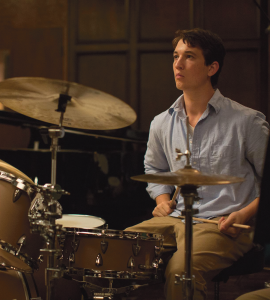
Miles Teller stars as aspiring drummer Andrew Neyman in the critically acclaimed drama “Whiplash.”
★★★★☆
At some point in our academic careers, we’ve all probably encountered who one teacher that led us out of our comfort zones. If not a teacher, then a coach or a personal mentor — someone who pushed us further than we first thought possible through a grueling, and even painful, journey. In the poignant new release “Whiplash,” drumming student Andrew Neyman (Miles Teller) is pushed to excruciating limits beyond what most of us have experienced.
A jazz drummer at a prestigious school of music in New York, Andrew lives and breathes music. With a father that never lived out his dreams of becoming a writer, Andrew is hard on himself and continually pushes himself, feeling much more pressure than most other students. Andrew wants to become one of the greats of music and will do anything to get there, even if it means impressing the brutal jazz band instructor, Terrence Fletcher (J.K. Simmons).
Fletcher demands an extreme amount of his students, driving one of them to commit suicide. How does one explain or justify Fletcher’s harsh ways of teaching? It is definitely up for debate as to whether or not Fletcher went too far, but according to him, the “greats” of music only become great after receiving that dramatic and painful push. He constantly cites the example of Charlie Parker, a drummer who was only driven to success after another musician threw a cymbal at his head. According to Fletcher, if you quit after being pushed past your limits, as Parker had been, then you are simply not cut out to be a “Charlie Parker.”
Determined to become the next great drummer, Andrew listens to music day and night, torturing himself and moving himself to literal blood, sweat and tears. Every time Andrew plays, his obsession with the music and his playing is beyond intriguing. He sweats as if he has just run a marathon, and to add a little bit of gore to the film, the blisters on his hand from overplaying would burst and saturate double layers of Band-Aids, exemplifying his overly dedicated and obsessed state of mind.
The movie overall was enthralling. Directed by Damien Chazelle, the film has already played at the Sundance Film Festival in January, receiving the Grand Jury Prize for a Dramatic Film and the Dramatic Audience Award. It is definitely deserving of this prestigious honor, as “Whiplash” is so poignantly and effectively told.
When Andrew felt pain or disappointment, it seemed as though the audience in the theater felt his intense pain and suffering as well. For example, when Andrew’s family members get attention for being on high school sports teams, Andrew is frustrated beyond belief that his excruciating efforts are unnoticed. This is easy to relate to in most families and that all-too-familiar sibling rivalry between kids who want to be recognized for their accomplishments.
As an audience member, I wanted so badly for Andrew to succeed and for the instructor to tone down his cruelty, but at the same time, had Fletcher not been so extreme, Andrew’s successes would not have been so monumental. Andrew persisted even when his physical and emotional states were in jeopardy, and his determination was truly inspirational. The emotion was raw and realistic throughout the film, and the storyline was extraordinarily suspenseful.
Although the film is not just for music lovers, it is certainly music-oriented. The extent to which the movie focused on the music itself was a bit excessive. While the compositions and the drum solos were certainly enjoyable and more than well-done, it was a bit exhausting to continuously hear music throughout almost the entire film. However, with this exception, the film adequately incorporated musical references in a way that every audience member could understand.
“Whiplash” truly has great depth and meaning, going beyond the surface of the difficulties in pursuing a musical career. The film explores what college-age students and young adults are feeling most — an immense amount pressure. Thus, “Whiplash” easily relates to any audience member that has once felt or is currently feeling Andrew’s stress and desire to become someone significant.



















